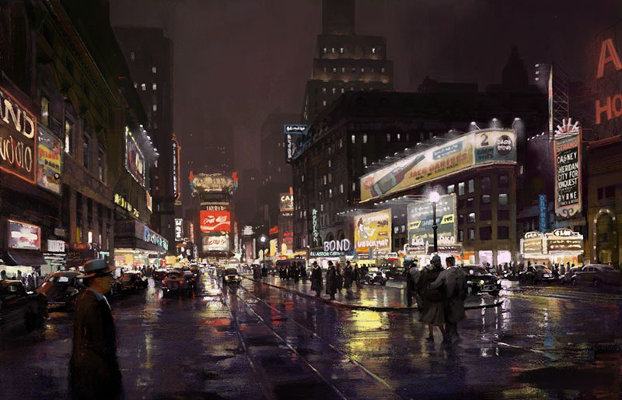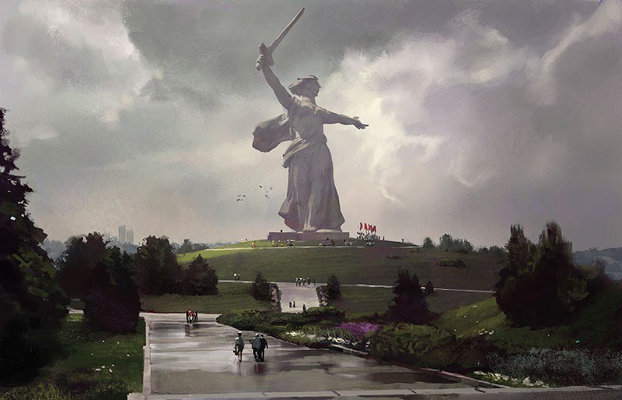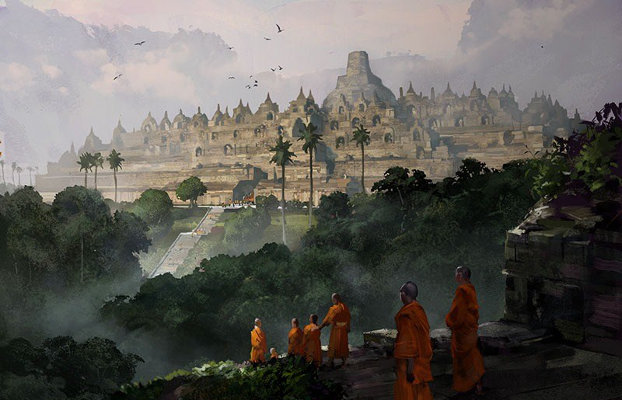 |
1. New Culture Victory
How does it work?
|
The culture game has changed quite a bit. Up until this point, achieving a culture victory involved building as many culture-generating buildings as possible while turtling up and avoiding conflict. Once the late game arrived, this could tend to be less exciting and engaging than many of the other victory conditions.
What we’ve done is created an entirely new way to play the culture game, one that involves your civilization becoming the dominant cultural influence in every other civilization in the game. How do we do this? We’ve basically split the culture game into two different components. You have your traditional culture yield that you generate, which is your defense against other civilizations. This is still generated the same way as before, but you will notice something new on some of your cultural buildings and wonders; slots for a new entry to the series called Great Works (which include Great Works of Art, Music, and Literature, created by Great Artists, Great Musicians, and Great Writers). When you create these Great Works, and place them in your culture buildings, they start generating a new yield called Tourism. Tourism is your offense against the other civilizations of the world. Additionally, you can boost your tourism with open borders, trade routes, shared religion, etc. Ultimately, to win the game, if your lifetime accumulation of Tourism exceeds each other civs lifetime accumulation of Culture, you will achieve a Culture Victory. There are plenty of other ways to influence the culture game, including the new late-game Archaeology system, but we’ll save that for later.
|

|
| Cultural wonder Broadway
|
2. New Policies and Ideologies
What are Ideologies in Civ5?
|
When you reach a certain point in the game, you will be asked to pick a direction for your people by choosing an ideology. There are three Ideologies, roughly corresponding to the major ideologies in the world at the start of the 20th Century: Freedom, Autocracy, and Order, each with their own benefits for the different victory types.
|
How do Ideologies relate to Policies?
|
The policy tree has changed quite a bit since Gods and Kings. We’ve added two new branches (Exploration and Aesthetics), and moved Ideologies to their own area at the end of the tree. After you unlock a branch, you can purchase ideological tenets with culture as you would normal policies, but their trees contain many more options for you to build on.
|
Can Ideologies spread (similar as Religions)?
|
No, although different civilizations with differing ideologies can have effects on each other depending on how culturally strong one civilization is over the other.
|
3. World Congress
How does it work?
|
The World Congress is a coalition of all the civilizations of the world that meet to discuss and agree upon proposed resolutions.
|
What are the preconditions?
|
The Congress is founded, typically in the Renaissance, by the first player that has discovered all other civilizations. The founding civilization becomes the Congress's host and receives special benefits, like the ability to propose resolutions. After the first resolutions are proposed, there’s a countdown until the Congress convenes, which will give you time to get allies on your side before the Congress votes on the proposed resolutions. The process then begins again, with the proposal of resolutions.
|
Examples of resolutions?
|
There are quite a few. You can vote to outlaw the trade of certain luxury resources, sanction rogue nations economically, start a worldwide project like the World’s Fair, and much more. You can use it to slow down a Civ who is running away to victory, or really put a major rival at a disadvantage.
|

|
| Cultural wonder The Motherland Calls
|
4. International Trade Routes
How does it work?
|
Trade Routes are established between two cities of different civilizations using trade route units like the Caravan or Cargo Ship. Although both parties gain gold from the route, the civilization that the trade route originates from gets a larger sum of gold than the destination civilization. Additionally, other systems hitch a ride on trade routes, like religious pressure, science (science can be gained from more advanced civilization this way), Tourism bonuses, and more.
Additionally, trade routes can also be created between two cities of the same civilization. Once the origin city has a Granary, it can send food to the destination city, and once it has a Workshop it can send production. This can be powerful if you have a new city that needs to be “pumped up”, or a city that’s constructing a Wonder that could use a production bump.
|
What are the preconditions?
|
Caravan units (the earliest trade unit) become available after you’ve researched Animal Husbandry. They can be used to establish land-based trade routes, and have a limited range that they can travel. Even though you can only have a single trade route at the beginning of the game, you unlock additional trade routes as your civilization becomes more advanced.
|
Are there links to diplomacy?
|
Yes! A lucrative trade route is going to give you a positive modifier to your relationship with that partner, and if you’re spreading religion then you’re likely to see a benefit from that as well. Sometimes it pays to make friends. Sometimes your friends pay you, too.
|
5. Four new gameplay systems
What do you mean by this?
|
When we mention four new gameplay systems, we’re referring to the new stuff outlined above. What is not mentioned above is the new Archaeology system: that will open up a new era of discovery in the late game, and contributes heavily to the new Culture game.
|
6. Two New Scenarios
Can you give short descriptions?
|
The Civil War scenario focuses on the key conflict in the Eastern Theater where the Union and Confederate capitals were both at risk. It’s a detailed examination of this portion of the conflict with monthly turns.
The Scramble for Africa scenario is set in late 19th Century Africa, just as the European powers were taking an interest in the Dark Continent. The interior of Africa is randomly generated each game. Combined with a large choice of available civilizations, this is a scenario you can play repeatedly with a different result each time.
|
Which of the new features mentioned above do you use here?
|
The trade and archaeology systems both play a key role in the Scramble for Africa.
|
Thank you!
|

|
| Cultural wonder Borobudur temple
|
|
|
 |







